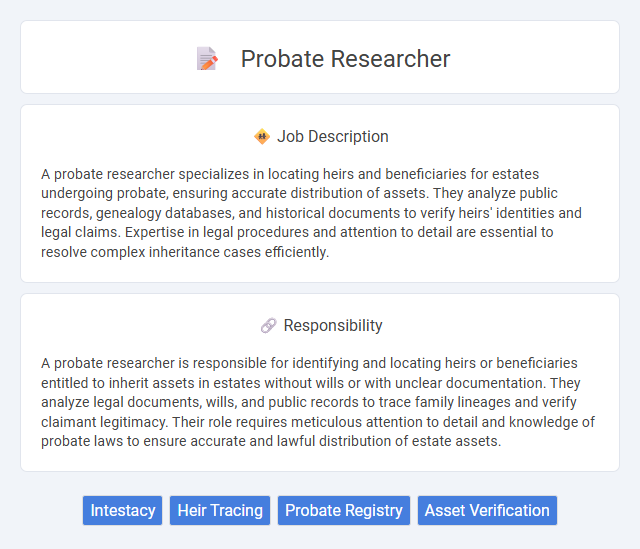
A probate researcher specializes in locating heirs and beneficiaries for estates undergoing probate, ensuring accurate distribution of assets. They analyze public records, genealogy databases, and historical documents to verify heirs' identities and legal claims. Expertise in legal procedures and attention to detail are essential to resolve complex inheritance cases efficiently.
Individuals who are detail-oriented and possess strong analytical skills are likely suitable for a probate researcher job, as it involves thorough investigation of estate records and legal documents. People with patience and persistence may have a higher probability of success, given the often complex and time-consuming nature of probate research. Those who struggle with attention to detail or prefer fast-paced, dynamic environments might find this role less suitable.
Qualification
A Probate researcher requires strong analytical skills with knowledge of legal documents, estate settlements, and property records. Qualifications typically include a background in law, paralegal studies, or real estate, combined with experience in public records retrieval and case analysis. Proficiency in legal databases, attention to detail, and effective communication skills are essential for accurately identifying heirs and facilitating probate processes.
Responsibility
A probate researcher is responsible for identifying and locating heirs or beneficiaries entitled to inherit assets in estates without wills or with unclear documentation. They analyze legal documents, wills, and public records to trace family lineages and verify claimant legitimacy. Their role requires meticulous attention to detail and knowledge of probate laws to ensure accurate and lawful distribution of estate assets.
Benefit
Probate researchers likely offer significant value by identifying heirs and uncovering unclaimed assets in estate settlements, potentially increasing recovery rates for beneficiaries. Their expertise in navigating complex probate records may reduce legal costs and expedite the inheritance process. Employing a probate researcher might improve overall efficiency and accuracy in estate administration.
Challenge
Probate researchers likely face the challenge of navigating complex legal documents and tracing heirs who may be difficult to locate or verify. The probability of encountering incomplete records or conflicting information increases the difficulty of accurately identifying rightful beneficiaries. This role often demands meticulous attention to detail and persistence under time constraints to avoid costly errors in the probate process.
Career Advancement
Probate researcher careers offer significant potential for advancement through specialization in estate law, valuable networking with legal professionals, and gaining expertise in asset tracing and legal documentation. Developing strong analytical skills and a deep understanding of probate procedures enhances opportunities for senior roles or consultancy positions. Continued education and certifications in legal research and estate administration further accelerate career growth and earning potential.
Key Terms
Intestacy
A probate researcher specializing in intestacy cases investigates estates where individuals die without a valid will, tracing heirs and determining rightful beneficiaries according to state laws. They analyze legal records, probate documents, and genealogical data to identify next of kin and resolve ownership disputes. Expertise in intestacy statutes and inheritance rules ensures accurate estate administration and asset distribution.
Heir Tracing
Probate researchers specialize in heir tracing by locating and verifying legitimate beneficiaries of estates through meticulous examination of public records, genealogical data, and legal documents. They use advanced database searches and forensic genealogy techniques to accurately identify heirs, often uncovering extended family connections overlooked in traditional probate processes. This expertise ensures proper distribution of assets and prevents legal disputes by confirming rightful inheritance claims.
Probate Registry
A Probate Researcher specializes in locating and verifying wills, estate records, and executor details within Probate Registry systems to facilitate the smooth administration of estates. They analyze legal documents and registry databases to confirm asset ownership and ensure compliance with probate laws. Expertise in Probate Registry protocols and document retrieval significantly enhances estate settlement efficiency and accuracy.
Asset Verification
Probate researchers specialize in asset verification by locating and assessing the financial holdings and property of deceased individuals to ensure accurate estate distribution. This role involves analyzing legal documents, such as wills and property records, combined with public and private databases to uncover hidden or overlooked assets. Expertise in asset verification enables probate researchers to support executors and legal professionals in settling estates efficiently and minimizing potential disputes.
 kuljobs.com
kuljobs.com